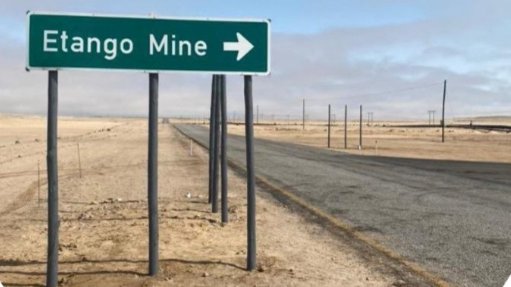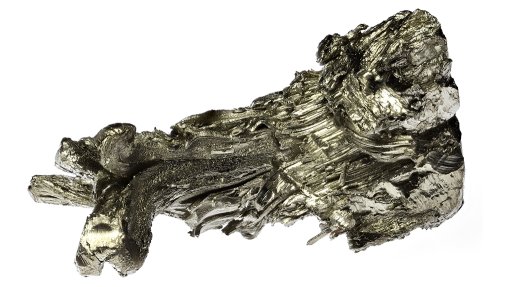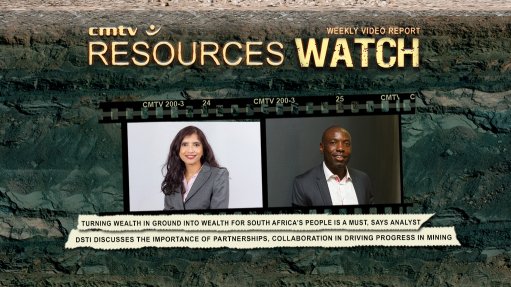Minerals Council scoring big on South Africa’s socioeconomic transformation front

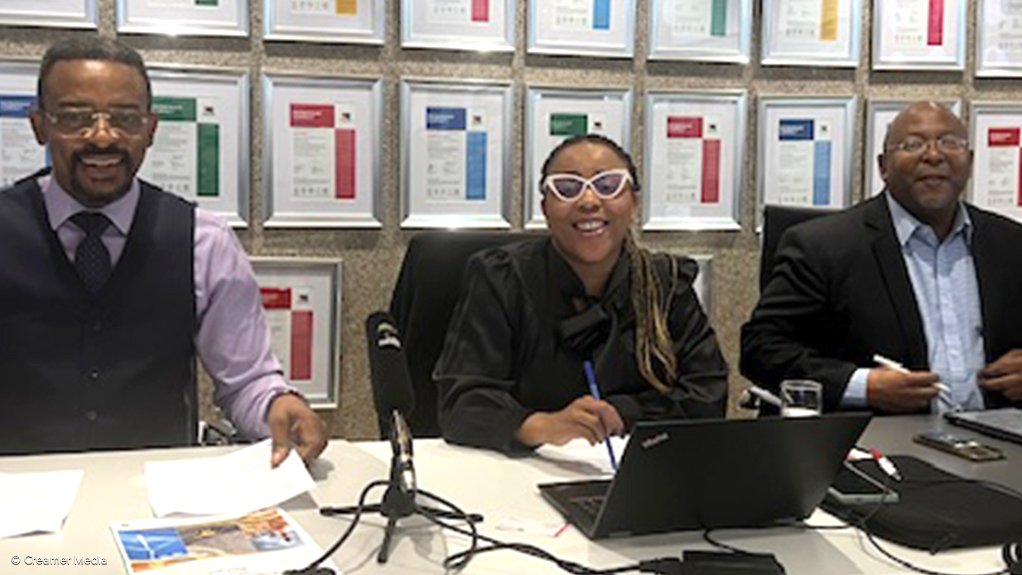
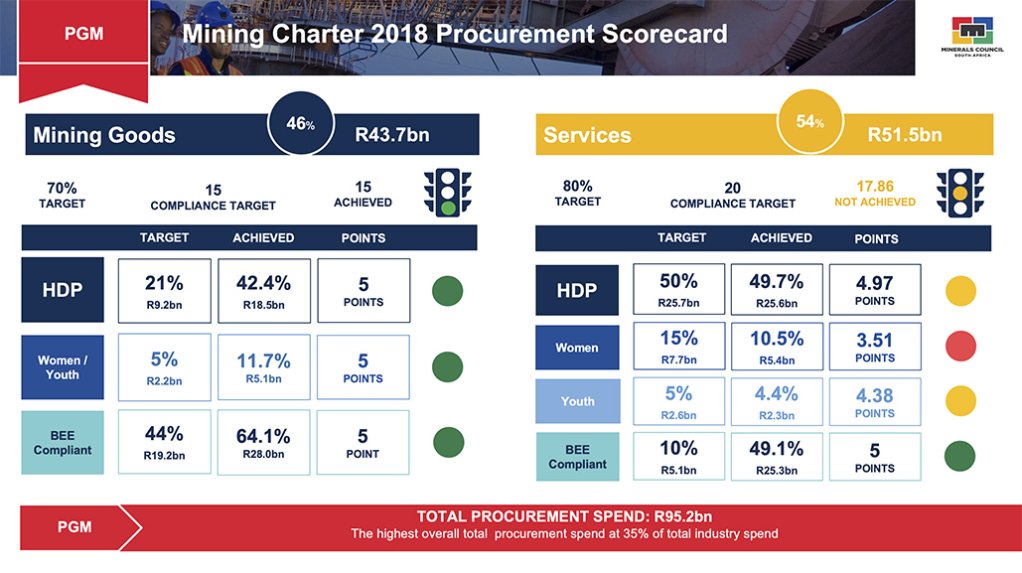
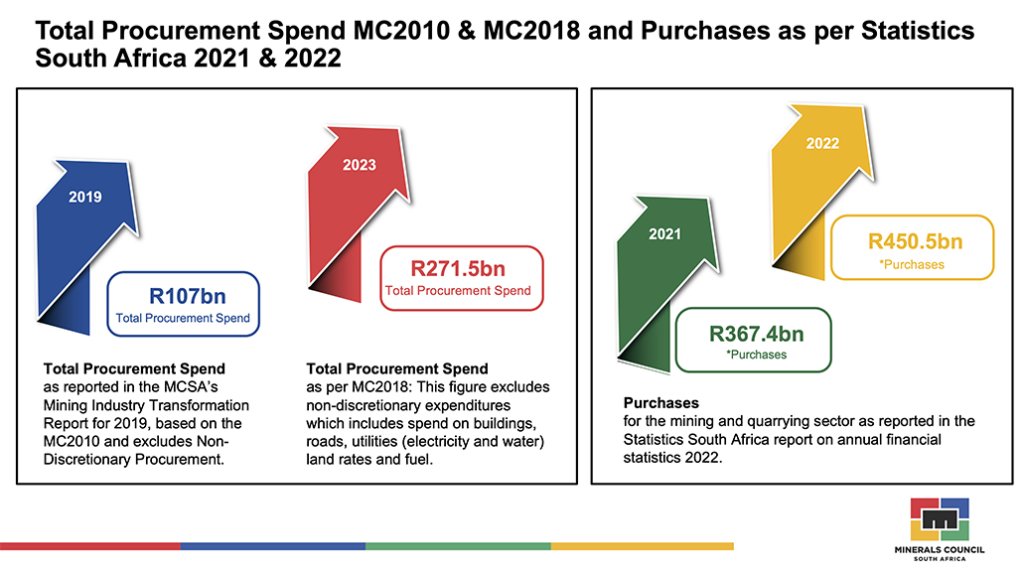
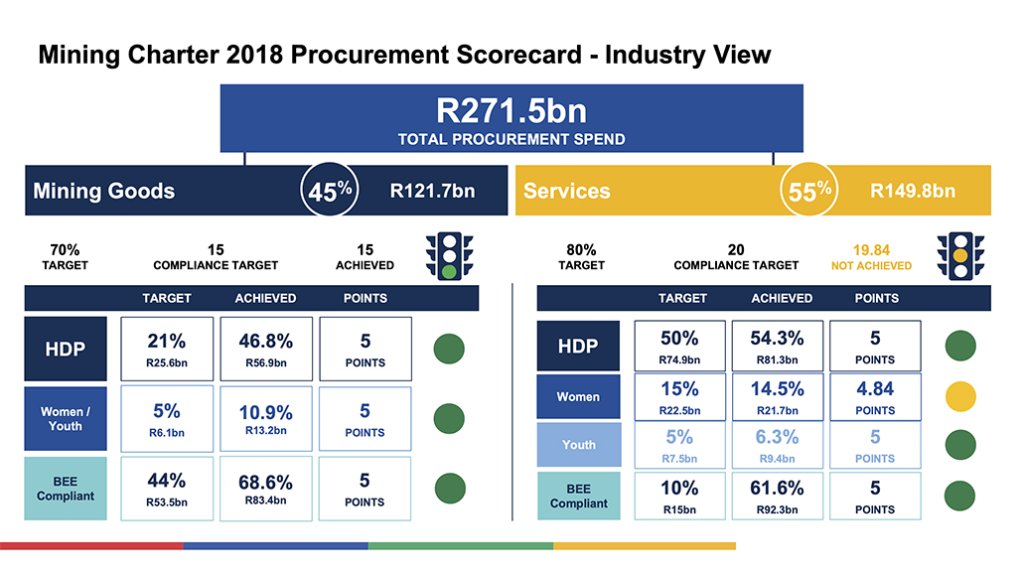
Minerals Council CEO Mzila Mthenjane, senior policy analyst, public affairs and transformation Fundiswa Ndaba, and senior executive, public affairs and transformation Tebello Chabana.
Photo by Creamer Media
Procurement Scorecard.
Total procurement spend.
Mining Charter.
JOHANNESBURG (miningweekly.com) – Minerals Council South Africa has been scoring big on the transformation front, going well beyond compliance, and hopes are now high that the upcoming Minerals and Petroleum Resources Development Act (MPRDA) Amendment Bill will create a legislative context to allow mining to shift from potential to performance.
This was made clear on Wednesday, April 9, by Minerals Council CEO Mzila Mthenjane, senior executive, public affairs and transformation Tebello Chabana, chief economist Hugo Pienaar, and senior policy analyst, public affairs and transformation Fundiswa Ndaba in the first of what are expected to be many more roundtable media briefings.
“The mining industry has made the significant progress in transformation, despite the headwinds and the constraints caused by years of regulatory and policy uncertainty, the slow processes of approving prospecting and mining rights, hence hampering the growth of the industry, operational constraints caused by the irregular and increasing cost of electricity and logistics, which at the best of times, have not been reliable, both in terms of rail and ports,” Mthenjane pointed out.
“From a legislative perspective, we’re expecting the Department of Mineral and Petroleum Resources to gazette its MPRDA Amendment Bill in due course, and from our perspective, we do expect a sensible, investor-friendly change to the MPRDA that addresses negative sentiment towards South Africa's mining and prospecting sectors.
“It’s a Bill which we hope will encourage and support investment, firstly in exploration, and then providing for a shift in sentiment that results in continuing mine development from the exploration, as well as continued investment in current mines, which continue to contribute and support the country through contribution to the fiscus.
“Combined, we see this growing the industry, and hence, by extension, will create more employment, create more opportunities for new entrants and entrepreneurs and mining industrialists.
“Let's not forget that miners are also industrialists, and I think, also contributing to even greater transformation than what we have achieved in the past and benefiting communities and the entire country.
“I do believe that the industry can do so much more than it is currently, and so the legislative context for mining has to enable a shift, and the industry needs to shift from potential to performance,” Mthenjane added.
REGULAR MEDIA ROUNDTABLES
Going forward, Minerals Council South Africa intends holding regular media roundtable briefings “to get to understand what’s going on in the mining industry”, communications head Allan Seccombe stated.
“I think that’s going to be a key thing for us, to bring media stakeholders along with us on our journey as we strive for growth, safety, employment - all the good things that we all want for our country and certainly our mining industry."
The focus of the first roundtable briefing was on transformation, which Seccombe described as “a critical aspect of our industry, particularly as we address our legacy with the industry, looking at a lot of things the mining industry was historically known for and trying to rectify that”.
It’s been a journey since the advent of democracy, the publication of the Mining Charter “and I think the mining industry has continued to prioritise socioeconomic transformation over that period”, Mthenjane explained.
“You'll all be familiar with the structure of the Mining Charter, which is really consistent with several other industry charters, including, amongst other things, black ownership, employment, equity, preferential procurement, enterprise and supply development, skills development, as well as social economic development,” added Mthenjane.
Specific to the mining industry are also Social and Labour Plans, which are also a regulatory MPRDA provision.
Starting with empowerment transactions and dating back to the early 1990s, the first transaction was done by Anglo American. They sold 51% of their subsidiary Southern Life shareholding in African Life to Real Africa for R163-million.
Since then, empowerment deals done in the mining industry have amounted to around R235-billion.
Mining has done these deals over this 25- to 30-year period in a context of the mining industry going through tough times in South Africa. Transactions created companies such as Shanduka Resources, Mvelapanda Platinum, Exxaro Resources, a diversified coal and energy business, African Rainbow Minerals, which is a Top 40 Johannesburg Stock Exchange (JSE) company, as well as private entities such as United Manganese of the Kalahari.
“Transformation has been across a diversity of commodities and regions, and I should also mention other outstanding companies such as Seriti Resources, which continues to grow as an energy company, Thungela Resources, which has gone even further to diversify offshore.
“And this empowerment has extended further to communities through trust structures which have been created to ensure that these economic benefits extend to broader members of society and thus growing the economy even further.
“Now, the mining industry has continued to be guided by the Mining Charter as an instrument to expand opportunities for historically disadvantaged persons of South Africa to enter the mining and minerals industry,” Mthenjane outlined.
Since 2004, there have been further iterations of the Mining Charter, in 2010 and then in 2018.
Continuing on ownership between 1993 and 2020, the deals that have taken place have been a combination of equity transactions for companies that are listed on the JSE, the sale of mining operations, and in others, the transfer of mining rights.
Minerals Council analysis shows that its members, who represent 70% of total South African mining production, have made beyond-compliance transformative enterprise and supplier development, or ESD, and procurement contributions.
Results show that mining companies achieved 39% weighted average of empowerment shareholding against the 26% that was promulgated in the 2010 Mining Charter, and even more than the 30% stipulated in the recent charter.
What this also represents is that the ownership is broad-based, meaning that it includes not only entrepreneurs, but also employees and communities who share in the growth of these companies.
Employees were shown to own a total weighted average ownership of 7.5%, communities 9.4% and entrepreneurs 22.3%.
Moreover, women currently represent 19% of the total full-time mining workforce, which represents some 91 000 of the total 480 000 employees – and this advance is from a history where women were totally excluded from working in the mining industry, no matter their colour.
A 2023 study to assess human resources development showed R4.8-billion being invested on employees and non-employees by member company participants against an estimated R7-billion being spent by the total industry, exceeding the Mining Charter target of 5% by hitting the of 5.3% mark.
Mine community development and investments through Social and Labour Plans, which is the main vehicle through which many mining companies invest in communities, was well beyond the 1% that is often stipulated for corporate social investment in many of the sector charters.
On an annual basis, it is estimated that mining spends more than R3-billion a year on Social and Labour Plans across various social services. This extends from building schools and roads in the communities where individual mines operate, and this has recently extended to water and sanitation, bridges, and major infrastructure.
“In fact, I can confidently say that there's been significantly more expenditure outside of the Social and Labour Plan. When you look at areas in Limpopo, for instance, such as the Lebalelo water project, and then in the Northern Cape, the Vaal Gamagara water project, we've seen many communities are affected by poor water infrastructure, and where mines are present, they are actively participating and engaging with local, provincial and national government to try and refurbish and, in most instances, replace this infrastructure at huge capital cost.
“So, I think it's important that we mention that Minerals Council South Africa and its members have been on a consistent path of transformation,” said Mthenjane during the roundtable, which was covered in-person by Mining Weekly.
Article Enquiry
Email Article
Save Article
Feedback
To advertise email advertising@creamermedia.co.za or click here
Press Office
Announcements
What's On
Subscribe to improve your user experience...
Option 1 (equivalent of R125 a month):
Receive a weekly copy of Creamer Media's Engineering News & Mining Weekly magazine
(print copy for those in South Africa and e-magazine for those outside of South Africa)
Receive daily email newsletters
Access to full search results
Access archive of magazine back copies
Access to Projects in Progress
Access to ONE Research Report of your choice in PDF format
Option 2 (equivalent of R375 a month):
All benefits from Option 1
PLUS
Access to Creamer Media's Research Channel Africa for ALL Research Reports, in PDF format, on various industrial and mining sectors
including Electricity; Water; Energy Transition; Hydrogen; Roads, Rail and Ports; Coal; Gold; Platinum; Battery Metals; etc.
Already a subscriber?
Forgotten your password?
Receive weekly copy of Creamer Media's Engineering News & Mining Weekly magazine (print copy for those in South Africa and e-magazine for those outside of South Africa)
➕
Recieve daily email newsletters
➕
Access to full search results
➕
Access archive of magazine back copies
➕
Access to Projects in Progress
➕
Access to ONE Research Report of your choice in PDF format
RESEARCH CHANNEL AFRICA
R4500 (equivalent of R375 a month)
SUBSCRIBEAll benefits from Option 1
➕
Access to Creamer Media's Research Channel Africa for ALL Research Reports on various industrial and mining sectors, in PDF format, including on:
Electricity
➕
Water
➕
Energy Transition
➕
Hydrogen
➕
Roads, Rail and Ports
➕
Coal
➕
Gold
➕
Platinum
➕
Battery Metals
➕
etc.
Receive all benefits from Option 1 or Option 2 delivered to numerous people at your company
➕
Multiple User names and Passwords for simultaneous log-ins
➕
Intranet integration access to all in your organisation














